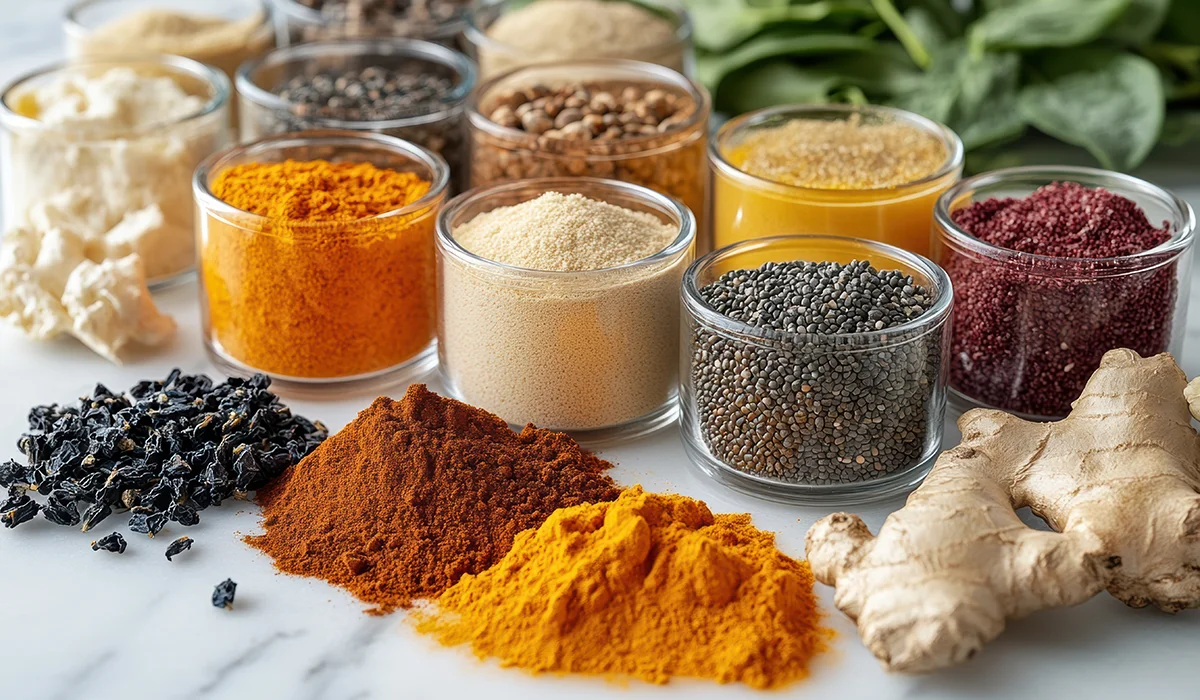Studies show up to 80% of women face hormone imbalances during their lifetime. Men aren’t immune either – they report hormonal disruption symptoms more frequently than ever before. These imbalances can affect various hormones, including testosterone for women, which plays a crucial role in overall well-being. In fact, understanding what testosterone does for women is essential in addressing these imbalances.
Modern life takes its toll on our hormonal health through stress, inadequate sleep, and environmental toxins. Traditional treatments are available, including hormone replacement therapy and testosterone therapy for women, yet people seek natural alternatives that align with their body’s processes. Many women ask, “Can women take testosterone?” or “Should women take testosterone?” The answer depends on individual needs and should be discussed with a healthcare provider.
Adaptogens provide an answer to this challenge. These extraordinary herbs and roots have centuries of use in traditional medicine. They help your body handle stress and maintain equilibrium – much like nature’s own team of stress-fighting, hormone-balancing superheroes. While not a direct replacement for testosterone supplements for women, adaptogens can support overall hormonal balance.
Your body can benefit from specific adaptogens whether you struggle with thyroid problems, adrenal fatigue, or reproductive hormone imbalances, including low testosterone in women. These powerful plants help restore your natural rhythm. In this piece, you’ll learn about their mechanisms, find the right ones for your needs, and understand how to use them properly. We’ll also touch on how adaptogens might complement other treatments, such as low dose testosterone for females.
Nature’s path to hormone balance awaits. Let’s take a closer look at these remarkable plants and how they might work alongside options like testosterone cream for women or testosterone injections for women!
Understanding Hormone Imbalances and Their Signs
Nearly half of U.S. women aged 30 to 60 have dealt with hormone imbalance symptoms. Many didn’t even know their symptoms were related to hormones – about 72% missed this connection [1]. This lack of awareness extends to understanding why women take testosterone or the potential benefits of testosterone boosters for women.
Common Symptoms of Hormonal Imbalance
Our bodies show several signs when hormones fall out of balance. These signs include:
- Unexplained weight changes and fatigue
- Mood swings and sleep disruptions
- Irregular menstrual cycles
- Skin changes and hair issues
- Digestive problems
- Changes in libido and sexual function
For women, these symptoms may also indicate low testosterone levels. Testosterone for women is essential for maintaining bone density, muscle mass, and libido. Some women may consider testosterone replacement therapy for women to address these issues. It’s important to note that testosterone therapy in women is often used to treat hypoactive sexual desire disorder, though this is considered an off-label use as it lacks FDA approval for this specific purpose.
How Stress Affects Hormone Levels
Stress creates major changes in our body’s hormone production. Research shows that hormone levels can increase two to fivefold during stressful times [2]. This sets off a chain reaction: cortisol spikes, thyroid function drops, and reproductive hormones, including testosterone and estrogen, often decrease [2].
These changes show up clearly in our endocrine system. Long-term stress keeps cortisol levels high, which can trigger insulin resistance, thyroid problems, and reproductive issues [3]. Our body stays in fight-or-flight mode, which affects many hormone pathways [3], including those regulating testosterone for women. This stress response can contribute to androgen deficiency, potentially leading some women to consider options like testosterone pellets for women or topical testosterone for women.
The Role of Adaptogens in Hormone Regulation
Adaptogens offer a solution. These substances work with our immune-neuro-endocrine system and the hypothalamic-pituitary-adrenal axis [4]. They stand out because they help our body maintain balance and can offset physical problems caused by external stress [4]. While not a direct replacement for testosterone therapy in women, adaptogens can support overall hormonal health.
Adaptogens take a unique approach to hormone balance. Rather than just boosting hormone production, they help improve adrenal gland function and can stop excess hormone production when needed [4]. This smart response makes adaptogens different from other supplements – they work in harmony with our natural systems, potentially supporting healthy testosterone levels in women without the side effects of testosterone in women that might occur with direct supplementation.
These substances meet three vital requirements: they fight stress in multiple ways, help maintain body balance, and don’t disrupt normal body functions [4]. This makes them valuable tools for people dealing with hormone-related issues, including those considering testosterone therapy for women or exploring options like testosterone pills for women.
Top Adaptogens for Different Hormone Issues
Different adaptogens affect hormone balance in unique ways. Specific herbs target various parts of our endocrine system and work effectively to address hormone-related issues, including those related to testosterone for women. While adaptogens aren’t a direct substitute for testosterone supplements for women, they can support overall hormonal health.
Adaptogens for Thyroid Health
Ashwagandha leads our recommendations to support thyroid function. Studies show it can increase T3 and T4 levels by 41.5% and 19.6% respectively [5]. You should be careful because it might affect how well thyroid medications get absorbed [6]. This adaptogen may also support overall hormonal balance, potentially benefiting those considering low dose testosterone for females.
Schisandra proves to be another great choice for thyroid health. It boosts the central nervous system and enhances brain function, making it a great caffeine alternative if you’re battling thyroid-related fatigue [6]. While not directly related to testosterone therapy in women, supporting thyroid health can contribute to overall hormonal balance.
Herbs for Adrenal Support
Rhodiola rosea delivers amazing results for adrenal support. It helps balance cortisol levels and strengthens our body’s stress response system [7]. The real value of rhodiola lies in its impact on both hypothalamus and pituitary glands, which helps regulate overall hormone production [8], potentially benefiting testosterone levels in women.
Licorice root stands out for adrenal support. It extends cortisol’s activity in our body, which helps with adrenal fatigue [9]. You need careful dosing and monitoring to use it safely. While not a direct alternative to testosterone cream for women, supporting adrenal health can contribute to overall hormonal balance.
Best Options for Reproductive Hormones
Maca root shows remarkable benefits for reproductive hormone balance, including potential support for testosterone for women. Research proves it can:
- Support optimal functioning of the hypothalamus and pituitary
- Regulate FSH, estradiol, and progesterone levels
- Improve fertility and reproductive health [10]
Maca’s unique approach sets it apart from traditional hormone treatments. Unlike herbs that target just one or two hormones, maca supports the entire endocrine system by boosting the hypothalamus and pituitary’s optimal function [10]. This comprehensive support may benefit women considering testosterone replacement therapy or those experiencing perimenopause symptoms, including vasomotor symptoms.
Success with adaptogens depends on picking the right one for your specific needs. Starting with one adaptogen and watching how your body responds for two weeks works best [6]. After this period, you can assess whether adding another complementary herb makes sense or if you need to explore other options, such as testosterone injections for women.
These adaptogens powerfully support hormone balance, but they can’t replace proper medical care. Always work with a healthcare provider, especially if you have specific hormone conditions, are considering testosterone therapy for women, or take other medications. This is particularly important when dealing with conditions like osteoporosis or exploring the use of bioidentical hormones.
Creating Your Adaptogen Protocol
Creating an adaptogen protocol doesn’t have to be complicated. Let’s help you build a plan that works. The first step is matching adaptogens to your hormone needs, then learning to use them the right way. This approach can complement other treatments, such as low dose testosterone for females, when appropriate.
Determining the Right Dosage
The best approach to adaptogens starts with a lower dose that increases gradually. Research shows common adaptogens like ashwagandha need a daily dose of 250-500 mg to be beneficial [11]. Here’s what we suggest:
- Pick just one adaptogen to start
- Take the lowest recommended dose
- Watch how your body responds for two weeks
- Bump up the dose if needed
- Mix in other adaptogens once you know what works
This gradual approach is similar to how one might start with testosterone cream for women or other forms of testosterone therapy in women, always under medical supervision.
Best Times to Take Adaptogens
Your adaptogens will work better with the right timing. Most adaptogens can be taken throughout the day [12], but certain patterns give better results:
- Morning Adaptogens: Rhodiola and Asian ginseng boost energy and focus
- Evening Adaptogens: Ashwagandha and reishi help you relax and sleep
- Flexible Timing: Adaptogens like schisandra work well any time of day
Research shows adaptogens need time to influence your endocrine system [13]. Consistency is crucial, especially when using adaptogens to support hormone balance, including testosterone for women. This principle also applies when considering how much testosterone should a woman inject per week under medical guidance.
Choosing the Right Form (Powder, Tincture, Capsules)
Each adaptogen form brings its own advantages. Here’s what makes each option special:
Tinctures: These liquid extracts act quickly [14]. They absorb easily into your system and help fast. Perfect if you don’t enjoy pills.
Capsules: These work great if you have a busy lifestyle. They’re portable and give exact doses [15]. Most studies use capsules, which makes their dosage guidelines more reliable. This form is similar to how testosterone pills for women might be administered.
Powders: You can mix these into food or drinks easily. They make great long-term options and often pack extra nutrients from the whole plant [14].
Quality plays a vital role. Products with United States Pharmacopeia (USP) or Good Manufacturing Practice (GMP) seals [16] guarantee reliable standardized ingredients. This is crucial whether you’re using adaptogens or exploring options like the best testosterone for women under medical supervision.
The best results come from cycling your adaptogens every six weeks [17]. This keeps them working effectively and stops your body from building up tolerance. A similar principle often applies to hormone therapies, including testosterone therapy in women.
Safety Guidelines and Precautions
Adaptogens provide powerful benefits for hormone balance, but understanding their safety profile matters. Experience shows that knowing the precautions leads to better results, especially when considering adaptogens alongside other treatments like testosterone therapy for women.
Potential Side Effects and Interactions
Adaptogens are generally well-tolerated, though some people may experience mild side effects. Common reactions include:
- Digestive issues like nausea or diarrhea
- Headaches and drowsiness
- Changes in sleep patterns
- Mild anxiety or irritability [18]
Medication interactions raise significant concerns. Studies reveal that adaptogens were involved in 9% of adverse events among other antidepressants [19]. These interactions primarily affected how medications metabolize and work. This underscores the importance of medical supervision when combining adaptogens with treatments like testosterone troche for females or other forms of hormone therapy.
Who Should Avoid Adaptogens
Some groups should stay away from adaptogen use:
- Pregnant or breastfeeding women
- People with diabetes or blood pressure issues
- Those with autoimmune disorders
- Individuals with stomach ulcers
- People scheduled for surgery [20]
Special Caution: Ask your healthcare provider before taking adaptogens if you use medications for thyroid conditions, diabetes, mental health, or if you’re undergoing testosterone replacement therapy for women. Research shows that ashwagandha, for example, can interact with medications for diabetes, hypertension, and hyperthyroidism [18]. This caution extends to those using testosterone boosters for women or exploring options like transdermal testosterone.
Signs to Stop or Adjust Usage
Watch for these warning signs that suggest you should reassess adaptogen use:
- Persistent digestive problems
- Unusual changes in energy levels
- Sleep disruptions
- New or worsening anxiety
- Unexpected blood pressure changes [21]
Note that supplements don’t face the same regulations as medications [22]. Products with United States Pharmacopeia (USP) or Good Manufacturing Practice (GMP) seals often provide better quality assurance [16]. This is crucial whether you’re using adaptogens or exploring options like testosterone pellets for women under medical supervision.
Your body’s response needs monitoring during the first few weeks of adaptogen use. Stop taking them and consult your healthcare provider if concerning symptoms appear. Each person responds differently to adaptogens, and what helps one person might not suit another. This principle also applies to hormone therapies, including testosterone therapy in women.
Important Note: Most side effects remain mild, but some cases have required corrective therapy for severe reactions [19]. This highlights why starting with low doses and careful monitoring matters, especially when using adaptogens alongside treatments like testosterone therapy for women or addressing conditions like hypoactive sexual desire disorder.
Lifestyle Factors for Success
Taking the right supplements isn’t enough to succeed with adaptogens. Our research has found that lifestyle choices that support natural hormone balance can substantially boost how well our adaptogen protocol works, potentially enhancing the benefits of testosterone for women.
Dietary Considerations
Our hormones depend on good nutrition. Protein plays a vital role – experts recommend consuming 25-30 grams of protein per meal [23]. Here are the key dietary tips we recommend:
- Include healthy fats like olive oil and avocados
- Focus on fiber-rich foods for hormone clearance
- Choose root vegetables and whole grains
- Limit added sugars and artificial sweeteners
- Include fermented foods for gut health
Our hormones respond best to whole foods rather than processed alternatives. Eating a rainbow of vegetables gives our endocrine system the diverse nutrients it needs [24], supporting overall hormone balance, including testosterone levels in women. This dietary approach can complement other treatments, such as low dose testosterone for females, when medically appropriate.
Stress Management Techniques
Adaptogens help us handle stress, but they need support through daily practices. Studies show exercise increases hormone receptor sensitivity and improves nutrient delivery [25].
Meditation and regular physical activity can boost our levels of norepinephrine and serotonin – the feel-good hormones [23]. The sort of thing I love is that even eating chocolate can support these positive hormone changes! These practices can be particularly beneficial for those exploring options like testosterone therapy in women or dealing with menopausal symptoms.
Exercise and Sleep Recommendations
Our exercise routine should mix both strength training and cardiovascular activities. Research shows that high-intensity interval training can help prevent insulin resistance [25]. Strength training supports hormone balance, especially during the follicular phase of our cycle [26], and may help maintain healthy testosterone levels in women.
Sleep plays a key role in balancing hormones. Just one night of poor sleep can disrupt insulin levels [27]. The best hormone regulation happens with 7-9 hours of quality sleep each night [27]. These factors make the biggest difference:
Optimal Sleep Environment:
- Keep our bedroom cool and well-ventilated
- Use blackout curtains or sleep masks
- Remove electronics from the bedroom
- Maintain consistent sleep and wake times
Sleep debt can lead to increased appetite and insulin resistance [28]. A wind-down routine helps signal our body it’s time to rest and supports our natural hormone cycles. This is crucial whether you’re using adaptogens or exploring options like testosterone cream for women under medical supervision.
Note that these lifestyle factors work together with our adaptogen protocol. A balanced approach to diet, stress, exercise, and sleep creates the perfect environment for adaptogens to work effectively, potentially enhancing the benefits of testosterone for women and supporting overall hormonal health.
Conclusion
A balanced hormone system needs adaptogens and good lifestyle choices that work together. These powerful herbs can help with many hormone-related challenges. They support everything from thyroid function to reproductive health, including maintaining healthy testosterone levels in women.
Getting good results with adaptogens takes the right herbs, proper doses, and regular use. These natural allies give the best results when you also focus on quality sleep, good nutrition, exercise, and managing stress well. This holistic approach can complement other treatments, such as low dose testosterone for females, when medically appropriate.
Adaptogens bring amazing benefits for hormone balance, but safety comes first. You should work with healthcare providers and start slow, especially if considering testosterone replacement therapy for women. Pay attention to how your body responds. This combination of herbs and lifestyle changes can help restore your hormonal health naturally, potentially addressing issues like osteoporosis, menopausal symptoms, or hypoactive sexual desire disorder.
Your hormone balance is unique to you. Stay patient and stick with your chosen approach. Listen to your body’s signals and you’ll find the right combination that works for your needs, whether that includes adaptogens, lifestyle changes, or exploring options like testosterone therapy for women. Remember, the safety of testosterone use in women and its effects on cardiovascular health and breast cancer risk are still being studied, so always consult with a healthcare provider before starting any hormone therapy.
While adaptogens offer a natural approach to hormone balance, they’re not a one-size-fits-all solution. Some women may benefit from more targeted treatments, such as testosterone injections for women or testosterone pills for women, under medical supervision. Others might find relief from menopausal symptoms or improve their Free Androgen Index through a combination of adaptogens and lifestyle changes.
As we continue to learn more about hormone health, including the role of estrogen and testosterone in women’s bodies, it’s clear that a personalized approach is key. Whether you’re dealing with androgen deficiency, exploring bioidentical hormones, or simply looking to optimize your hormonal health, remember that your journey is unique. With the right combination of adaptogens, lifestyle changes, and medical guidance, you can work towards achieving hormonal balance and overall well-being.
References
[1] – https://www.kelsey-seybold.com/your-health-resources/blog/hormonal-imbalance-the-stress-effect [2] – https://pmc.ncbi.nlm.nih.gov/articles/PMC3079864/ [3] – https://plminstitute.org/plmi-blog/how-does-chronic-stress-weaken-the-endocrine-system/ [4] – https://pmc.ncbi.nlm.nih.gov/articles/PMC6240259/ [5] – https://pmc.ncbi.nlm.nih.gov/articles/PMC9035336/ [6] – https://www.drstacysims.com/blog/what-women-should-know-about-adaptogens [7] – https://www.rupahealth.com/post/rhodiola-rosea-a-natural-approach-to-managing-adrenal-fatigue [8] – https://pmc.ncbi.nlm.nih.gov/articles/PMC9228580/ [9] – https://www.rupahealth.com/post/licorice-root-a-natural-solution-for-adrenal-support-and-hormonal-health [10] – https://pmc.ncbi.nlm.nih.gov/articles/PMC3614604/ [11] – https://www.healthline.com/nutrition/ashwagandha-dosage [12] – https://vitalplan.com/blogs/blog/whats-the-best-time-to-take-adaptogens?srsltid=AfmBOoqWEmAktl7kUSBNn4oIHQT7ATvYvNXJEMtdJvZuKiYeD-NeF4dt [13] – https://www.humnutrition.com/blog/how-to-take-adaptogens/?srsltid=AfmBOoro8oEeLPOgGnDRQvCU7OAQKM6xY_c5zjsFYvhqakmX46mZz1Md [14] – https://www.apothekary.co/blog/powders-vs-tinctures-what-s-the-difference-for-my-herbs?srsltid=AfmBOor1kUTsnjK-Nwp3k3dS8HxfbVbL7noy1qGnWHfOqs-o4lOhwG3J [15] – https://www.mushroomrevival.com/blogs/blog/functional-mushroom-tinctures-vs-capsules-vs-powders-vs-gummies?srsltid=AfmBOoqj56PjIWIVdJ6it3GEuyBify8rlVAfUZAVk3kfhh869JH2Shum [16] – https://www.va.gov/WHOLEHEALTHLIBRARY/tools/adaptogens.asp [17] – https://www.vivolife.com/blogs/news/how-long-does-it-take-for-adaptogens-to-work?srsltid=AfmBOoo5Degc2egwdaD9Mj-WPapEYNaLgojUT-96vWTF0D_mm7zO7aEp [18] – https://www.healthline.com/health/adaptogenic-herbs [19] – https://pmc.ncbi.nlm.nih.gov/articles/PMC10565488/ [20] – https://www.bswhealth.com/blog/all-about-adaptogens-do-these-healing-herbs-really-work [21] – https://my.clevelandclinic.org/health/drugs/22361-adaptogens [22] – https://www.uclahealth.org/news/article/what-are-adaptogens-and-should-you-be-taking-them [23] – https://www.eatingwell.com/article/7805452/hormone-balancing-foods-how-diet-can-help/ [24] – https://nutrition4change.com/articles/top-10-foods-to-restore-hormone-balance/ [25] – https://www.healthline.com/nutrition/balance-hormones [26] – https://www.rupahealth.com/post/exercise-affects-on-womens-hormones [27] – https://www.healthline.com/health/sleep/how-sleep-can-affect-your-hormone-levels [28] – https://pmc.ncbi.nlm.nih.gov/articles/PMC4377487/






